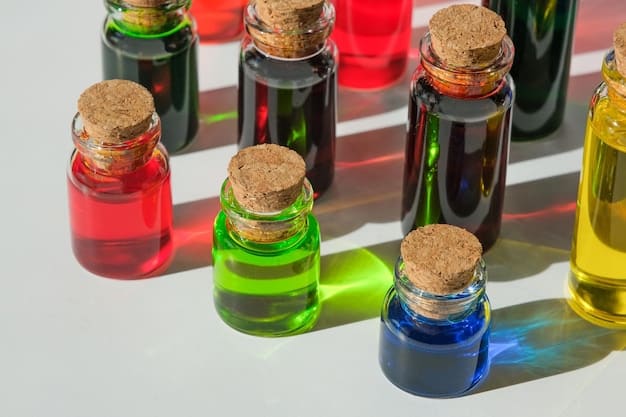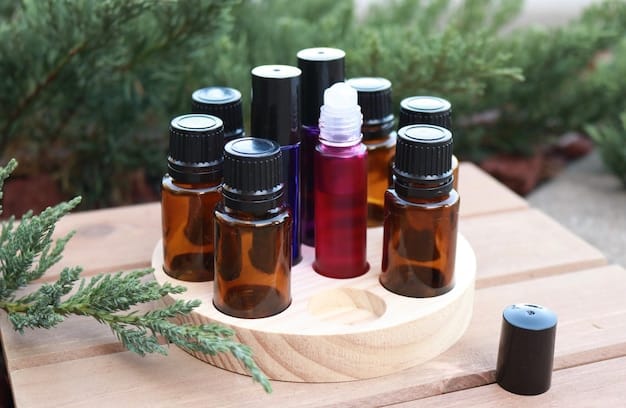Aromatherapy Benefits: Essential Oils for Mood and Stress Relief

Discover the Benefits of Aromatherapy: How Essential Oils Can Improve Mood and Reduce Stress by 10% through natural fragrances that can positively impact your emotional and physical well-being, promoting a sense of calm and relaxation.
Unlock the potential of nature’s pharmacy with discover the benefits of aromatherapy: how essential oils can improve mood and reduce stress by 10%. This ancient practice, now backed by modern science, offers a holistic approach to wellness, using aromatic compounds to enhance your emotional and physical health.
What is Aromatherapy?
Aromatherapy is a holistic healing practice that uses natural plant extracts, specifically essential oils, to promote health and well-being. It involves using aromatic essential oils therapeutically to improve physical, emotional, and psychological well-being. The goal is to enhance the body’s natural healing processes.
The History of Aromatherapy
Aromatherapy has roots stretching back thousands of years. Ancient civilizations, including the Egyptians, Chinese, and Indians, used aromatic plants and resins in medicines, perfumes, and religious ceremonies.
- Ancient Egypt: Egyptians used essential oils for embalming and medicinal purposes. They were skilled in extracting oils from plants like cedarwood and myrrh.
- Ancient China: Traditional Chinese Medicine incorporated aromatic herbs and plants for treatments and rituals.
- Ancient India: Ayurveda, the ancient Indian system of medicine, used aromatic oils for healing and spiritual practices.
These cultures recognized the power of scent and its ability to affect the mind and body.
How Aromatherapy Works
Aromatherapy works primarily through the sense of smell and absorption through the skin. When you inhale essential oil molecules, they travel through the olfactory system, which starts in the nose and ends in the brain. This system is directly linked to areas of the brain that control emotions, memories, and hormones.
When applied to the skin, essential oils are absorbed into the bloodstream, where they can have systemic effects. Carrier oils, like jojoba or almond oil, are often used to dilute essential oils for safe topical application.
In conclusion, aromatherapy is a time-tested practice that utilizes the power of natural scents to promote well-being through inhalation and skin absorption, affecting both the mind and body.
Essential Oils for Mood Enhancement
Certain essential oils have properties that can uplift your mood and promote feelings of happiness and well-being. These oils work by influencing the brain’s emotional centers, helping to alleviate stress and anxiety.

Popular Mood-Boosting Oils
Here are a few essential oils known for their mood-enhancing effects:
- Lavender: Known for its calming and relaxing properties, lavender can help reduce anxiety and promote sleep. Its floral scent is gentle and soothing.
- Lemon: The bright and citrusy aroma of lemon oil is invigorating and uplifting. It can help improve focus and reduce feelings of stress.
- Peppermint: Peppermint oil has a refreshing and stimulating scent that can boost energy levels and improve alertness.
These oils can be used individually or combined to create a personalized aromatherapy blend.
How to Use Essential Oils for Mood
There are several ways to use essential oils to enhance your mood:
- Diffusion: Add a few drops of your chosen essential oil to a diffuser to fill your space with its aroma.
- Topical Application: Dilute essential oils with a carrier oil and apply to pulse points, such as wrists and temples.
- Inhalation: Inhale directly from the bottle or add a few drops to a cotton ball and breathe deeply.
Experiment with different methods to find what works best for you.
In summary, specific essential oils like lavender, lemon, and peppermint can effectively boost mood through diffusion, topical application, or direct inhalation, offering a versatile approach to emotional wellness.
Reducing Stress with Aromatherapy
Stress is a common issue in today’s fast-paced world. Aromatherapy offers a natural way to combat stress by promoting relaxation and reducing tension. Certain essential oils have calming properties that can help you unwind and find peace.
Best Essential Oils for Stress Relief
Consider these essential oils for stress reduction:
- Chamomile: Known for its calming and soothing properties, chamomile can help ease anxiety and promote relaxation.
- Frankincense: Frankincense has a grounding and balancing effect, helping to reduce stress and promote a sense of inner peace.
- Ylang-Ylang: This oil has a sweet, floral scent that can help calm the nerves and reduce feelings of anxiety and depression.
Creating a Relaxing Aromatherapy Routine
Incorporating aromatherapy into your daily routine can help manage stress levels. Here are a few ideas:
- Bath Time: Add a few drops of your favorite relaxing essential oil to a warm bath.
- Massage: Dilute essential oils with a carrier oil and use for a calming massage.
- Meditation: Diffuse essential oils during meditation to enhance relaxation and focus.
Consistency is key to experiencing the full benefits of aromatherapy for stress relief.
Ultimately, aromatherapy provides a valuable tool for stress management, with oils like chamomile, frankincense, and ylang-ylang, effectively promoting relaxation through baths, massages, and meditation.
Blending Essential Oils for Optimal Results
Combining essential oils can create synergistic effects, enhancing their individual benefits. Understanding the basics of blending can help you create custom aromatherapy blends tailored to your specific needs.
Understanding Fragrance Notes
Essential oils are often categorized by fragrance notes: top, middle, and base.
- Top Notes: These are the first scents you perceive, and they are typically light and refreshing. Examples include citrus oils like lemon and grapefruit.
- Middle Notes: These scents form the heart of the blend and are often floral or herbal. Examples include lavender and rosemary.
- Base Notes: These scents are rich and grounding, providing a foundation for the blend. Examples include cedarwood and frankincense.
A well-balanced blend includes oils from each fragrance category.
Sample Aromatherapy Blend Recipes
Here are a few blend recipes to get you started:
- Stress Relief Blend: 3 drops Lavender, 2 drops Chamomile, 1 drop Frankincense.
- Mood Booster Blend: 3 drops Lemon, 2 drops Peppermint, 1 drop Rosemary.
- Sleep Aid Blend: 4 drops Lavender, 2 drops Cedarwood.
Adjust the ratios to suit your preferences.
In conclusion, blending essential oils based on their fragrance notes (top, middle, and base) allows for the creation of customized aromatherapy blends that enhance their individual therapeutic effects, promoting holistic well-being.
Safety Tips for Using Essential Oils
While aromatherapy is generally safe, it’s important to follow certain safety guidelines to avoid adverse reactions. Essential oils are potent and should be used with care.

Dilution is Key
Essential oils should always be diluted before applying to the skin. Use a carrier oil, such as jojoba, almond, or coconut oil, to dilute essential oils. A general guideline is to use a 1-3% dilution, which means 1-3 drops of essential oil per teaspoon of carrier oil.
Patch Test Before Use
Before using a new essential oil, perform a patch test. Apply a small amount of diluted oil to a small area of skin and wait 24 hours to check for any allergic reactions.
Storage and Handling Tips
Store essential oils in dark glass bottles in a cool, dry place away from direct sunlight. Keep them out of reach of children and pets. Always close the bottles tightly to prevent oxidation and evaporation.
In summary, using essential oils safely involves dilution, patch testing, and proper storage to prevent adverse reactions and ensure their potency and longevity.
Scientific Evidence Supporting Aromatherapy
While aromatherapy has been practiced for centuries, modern research is beginning to validate its benefits. Numerous studies have explored the effects of essential oils on various aspects of health, including mood, stress, and sleep.
Research Studies on Mood and Stress
Several studies have shown that essential oils can effectively reduce stress and improve mood.
- A study published in the “Journal of Alternative and Complementary Medicine” found that lavender aromatherapy significantly reduced anxiety levels in patients undergoing dental procedures.
- Research in the “International Journal of Neuroscience” demonstrated that inhaling peppermint oil improved cognitive performance and reduced feelings of frustration.
- Another study in the “Journal of Complementary Therapies in Medicine” found that chamomile aromatherapy improved sleep quality and reduced symptoms of anxiety in elderly patients.
Expert Opinions on Aromatherapy
Many healthcare professionals are recognizing the potential benefits of aromatherapy. Integrative medicine practitioners often incorporate aromatherapy into their treatment plans to support overall well-being.
- Dr. Jane Buckle, a registered nurse and aromatherapist, emphasizes the importance of using high-quality essential oils and following safety guidelines.
- Dr. Andrew Weil, a renowned advocate for integrative medicine, acknowledges the potential benefits of aromatherapy for stress reduction and mood enhancement.
- The National Association for Holistic Aromatherapy (NAHA) provides resources and education on the safe and effective use of essential oils.
These experts emphasize that while aromatherapy can be a valuable tool, it should not replace conventional medical treatments.
To summarize, scientific evidence and expert opinions support the benefits of aromatherapy for improving mood and reducing stress, highlighting its potential as a complementary therapy when used safely and appropriately.
| Key Point | Brief Description |
|---|---|
| 🌿 What is Aromatherapy? | Holistic practice using essential oils for well-being. |
| 😊 Mood Enhancement | Lavender, lemon, and peppermint boost mood. |
| 🧘 Stress Reduction | Chamomile, frankincense, and ylang-ylang relieve stress. |
| 🧪 Safety First! | Always dilute and patch test essential oils. |
FAQ
▼
Essential oils can be used in diffusers to fill a room with their scent, applied topically when diluted with a carrier oil, or inhaled directly from the bottle or a cotton ball.
▼
Yes, certain essential oils like clary sage, rosemary, and basil should be avoided during pregnancy as they can potentially cause uterine contractions. Always consult a healthcare provider.
▼
Look for essential oils that are labeled as 100% pure and have a clear botanical name. Reputable brands often provide GC/MS testing reports to verify the oil’s composition and purity.
▼
Essential oils can be toxic to pets, especially cats. If you choose to use them, do so with extreme caution, ensuring they are heavily diluted and your pet has the option to leave the area.
▼
The duration of the scent depends on the type of diffuser and the essential oil used. Generally, the scent can last from 30 minutes to several hours in a well-ventilated room.
Conclusion
Aromatherapy offers a natural and effective way to enhance mood and reduce stress. By understanding the properties of different essential oils and following safety guidelines, individuals can unlock the numerous benefits of this ancient practice for improved well-being. Incorporating aromatherapy into your daily routine can lead to a more balanced and harmonious life.





